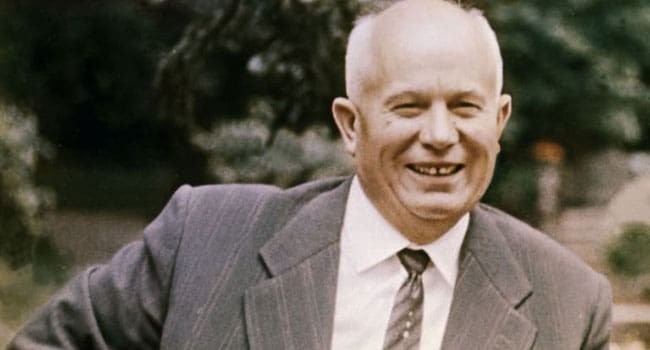 We’re used to summit conferences these days. In fact, sometimes it feels like we’re on a treadmill where a summit is either happening or about to happen. However, things weren’t always like that. In fact, after Potsdam in July/August 1945, it was a full decade before the Great Powers sat down together again. And it happened 60 years ago this month.
We’re used to summit conferences these days. In fact, sometimes it feels like we’re on a treadmill where a summit is either happening or about to happen. However, things weren’t always like that. In fact, after Potsdam in July/August 1945, it was a full decade before the Great Powers sat down together again. And it happened 60 years ago this month.
When the idea of the July 1955 Geneva summit was first bruited, American president Dwight Eisenhower was cool to the prospect. He had several reasons.
For one, managing public expectations is always an issue for open societies. The Second World War had finished only 10 years ago, the armistice ending the Korean War was just coming up to its second anniversary, and public opinion was still in the early stages of grappling with the sombre implications of the nuclear age. In a situation thus characterised by constant tension, it was important to keep a firm grip on the agenda.
For another, Eisenhower himself had what could be described as a brutally realistic view of the world. From his experience as wartime supreme commander in Western Europe, he was acutely aware of how quickly things could spin out of control and how you should always expect the unexpected. Starry eyed idealism wasn’t his thing.
And then there was the ghost of that other Great Powers summit – Yalta. In early post-war American political life, few themes were more potent than the idea that Josef Stalin had played Franklin D. Roosevelt for a sucker at the February 1945 Yalta conference, as a consequence of which Eastern Europe had been “sold out” to the Soviet Union. Such conferences, it was argued, invariably led to “appeasement, compromise, and weakness.”
Still, the clamour for a Great Powers conference took on a life of its own. And besides, Eisenhower had another objective. Sitting down face to face over several days would help the Americans answer an important question. With Stalin dead, just who was really running the show in Moscow?
So on July 15, 1955, Eisenhower set out for Geneva. Shortly before departure, he went on national TV and radio to declare his hope that the conference would “change the spirit” of Soviet-American relations; and, for good measure, he asked Americans to go to church that Sunday to pray for peace. In what was still an ostensibly religious age, it was the kind of touch that made sophisticates roll their eyes while simultaneously striking a chord with many others. Eisenhower’s two landslide election victories didn’t happen by chance.
Although referred to as a meeting of the Big Four, only the Americans and the Soviets really counted at Geneva. While Anthony Eden and Edgar Faure may have been accomplished politicians, their countries, Britain and France respectively, had become fundamentally inconsequential on the world stage. Had the Red Army rolled west, the American response would’ve been the only response that mattered.
In Geneva, one of Eisenhower’s first probes was a long private lunch with Georgy Zhukov, who’d commanded the Soviet push to Berlin in 1945. The two men had gotten along very well back then, and Eisenhower was anxious to discover whether Zhukov’s role as minister of defense meant he was a genuine power in the Kremlin set-up, and thus someone to do business with. To Eisenhower’s disappointment, he concluded that the answer was negative.
Then there was the Soviet premier Nikolai Bulganin, a distinguished looking man who could have stepped out of a scene from War and Peace. As Bulganin did much of the talking for the Soviet side, perhaps he was the one in charge. However, when Eisenhower put his surprise Open Skies proposal on the table, the penny dropped.
The Open Skies idea was for both the United States and the Soviet Union to permit unlimited reconnaissance flights over each other’s territory. Even better, they’d provide each other with the airfields and facilities necessary to make it happen. And in consequence of this mutual transparency, the possibility of surprise attacks would be reduced, thus leading to a relaxation of tension.
But while Bulganin initially seemed interested, Nikita Khrushchev, who was also at the table, quickly made it clear that he disagreed. As Eisenhower told congressional leaders on his return to Washington, he now knew who “the boss” in Moscow was. Whatever else emanated from Geneva, at least something had been clarified.
Pat Murphy casts a history buff’s eye at the goings-on in our world. Never cynical – well perhaps a little bit.
The views, opinions and positions expressed by columnists and contributors are the author’s alone. They do not inherently or expressly reflect the views, opinions and/or positions of our publication.


